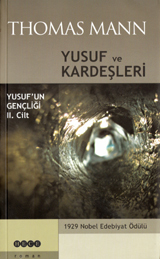What do you think?
Rate this book


296 pages, Paperback
First published January 1, 1933
“Tell me, son of the true wife,” he might ask him as they sat in the shade of the oracle tree, “for what three reasons did God create man last, after all growing things and beasts?”
To which Joseph had to respond: “God created man last of all: first, so that no one could say he had shared in all the other works; second, so that man might be humbled and say, ‘The blowfly came before me’; and third, so that he might at once sit down at the banquet table, as the guest for whom all has been prepared.”
“Creatures like you are but a fraud, who conceal beneath a fleeting, glittery surface the inner abomination of all flesh. Not that this skin, this husk, with its reeking pores and sweaty hair is all that appetizing – let it be rent but a little, and the salty brew gushes out in its red wickedness, and it only grows more abominable deeper within – sheer guts and stench. What is handsome and beautiful must be handsome and beautiful through and through, massive and of noble stuff, not crammed with glue and garbage.”